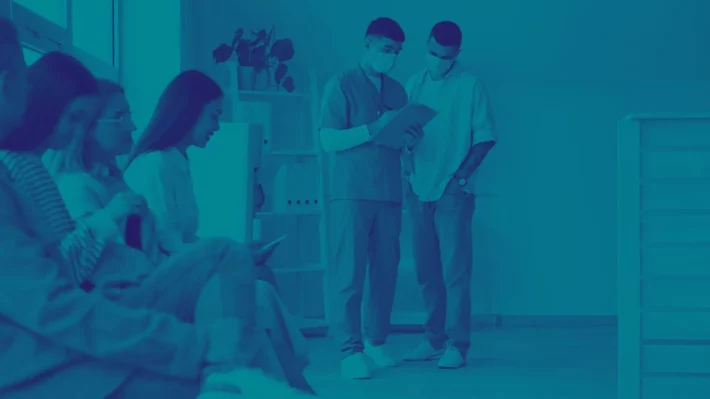Radiology Scheduling: How Specialized Schedulers Improve Center’s Operations

Discover how radiology scheduling services can help Centers improve workflow, offer seamless operations, enhance productivity, and reduce patient handling times through tailored radiology scheduling services.
Radiology scheduling is a complex process for small and large centers.
Ensuring that your center’s scheduling flow is efficient can take time, especially when considering modalities, equipment, software, and staff and then adding other variables like patient bookings, last-minute cancellations, and operations.
Now, while centers can’t take the complexity out of the process, they can choose how to manage and create a flow where all the players know what to do and how to do it and create an optimal experience for the patient and the physician.
Let’s dive into several ways a specialized service helps improve appointment booking efficiency at your radiology center.
The Challenges of Radiology Scheduling
Radiology scheduling can be complex and time-consuming, mainly due to various imaging modalities, equipment, and staffing requirements.
Patients often require different preparation procedures and may have individual medical histories, so schedulers must know radiology modalities to provide accurate and efficient service.
Let’s break down the three main challenges in radiology scheduling and how to overcome them:
-
Radiology modalities
One of the significant challenges in radiology scheduling is managing multiple imaging modalities. Radiology departments cover a wide range of procedures, such as X-rays, CT scans, MRIs, and ultrasounds.
Each modality has unique requirements and specifications, and scheduling the right one for each patient is crucial to ensure accurate diagnoses and optimal patient care. That’s why having a well-versed scheduler is essential for optimizing the appointment scheduling process.
- Radiologist subspecialties credentials
Due to their specialized expertise, radiologists typically have the credentials to work with only one type of subspecialty. This can create a challenge when providing cross-coverage for different subspecialties.
In spite of these challenges, many Radiology Centers choose to handle these variables manually or within a spreadsheet, leaving room for gaps or overlaps in schedule, which in the end, causes overbooking or underbooking appointments and affects not only patient experience but also efficient resource utilization.
- High call volume
With radiology centers receiving a high volume of calls, patients can face long wait times and limited availability, causing significant bottlenecks and hurdles in the radiology workflow and impacting efficiency.
Ways a mishandled high-call volume can impact the scheduling workflow:
- Increased waiting times
- Inefficient appointment scheduling
- Increased risk of missed appointments
- Communication and information management challenges
How a Radiology Call Center can help overcome radiology scheduling bottlenecks
Coordinating appointments can become quite complicated with so many variables involved, such as modalities and staff and equipment availability.
That’s where the help of a specialized radiology scheduling service comes in.
A Radiology Call Center is staffed by a team of highly trained professionals that understand the nuances of radiology scheduling and are equipped to handle all the complexities involved. This can help in two ways:
- Schedulers can educate and prepare patients for their radiology appointments and provide detailed instructions regarding necessary preparations, such as fasting or contrast administration.
This way, they can minimize delays and reschedule due to patients arriving unprepared for their procedures.
2. Provide patients with correct details about appointment dates, times, and specific instructions, reducing miscommunication and errors in scheduling information and avoiding no-shows or missed appointments.
One of the key benefits of using a Radiology Call Center is ensuring that all of your appointments are scheduled in the most efficient manner possible. This means reducing wait times, maximizing equipment usage, and improving overall patient satisfaction.
Additionally, they also play a key role in other parts of the process: patient communication and follow-up. This guarantees that patients are informed about their appointments. It can also improve patient compliance, leading to more successful outcomes.
Benefits of using a radiology scheduling service
With knowledge in the field of radiology scheduling and a deep understanding of the complexities involved, the staff is better equipped to handle any challenges that may arise and ensure that all appointments are scheduled in the most efficient way possible.
In addition, they also offer several other benefits. For one, they can save your staff a significant amount of time. Instead of having to spend hours on the phone trying to schedule appointments, your staff can focus on other important tasks.
Another benefit is improved patient satisfaction. A radiology appointment scheduler can ensure that patients are seen in a timely manner, which can reduce wait times and minimize the likelihood of patients becoming frustrated or anxious.
A radiology scheduling service can also help improve your center’s overall efficiency by reducing the number of missed appointments, optimizing staff resources, and ultimately increasing revenue for your center.
Overall, investing in a specialized radiology appointment scheduling service can be a wise decision for any center looking to delegate such an important part of the process but also looking to improve it and offer better service to its patients.
How an effective radiology scheduling process works
If you’re considering partnering with a radiology call center to help with your scheduling, you may be wondering how the process actually works. While every call center may have slight variations in its process, there are generally a few key steps involved in radiology scheduling with a call center:
- Information gathering: When a patient or referring physician contacts the call center to schedule an appointment, the scheduler will need to gather all relevant information about the patient’s medical history and imaging needs. This may include the type of imaging requested, any previous imaging studies, insurance information, and more.
- Scheduling: Once all necessary information has been collected, the scheduler will work with the patient to find an appointment time that works best for them. This may involve coordinating with the imaging center to find an available time slot and ensuring the patient has all necessary pre-exam instructions (such as fasting or avoiding certain medications) before their appointment.
- Confirmation and follow-up: The call center will typically send the confirmation information to the patient and the imaging center after the appointment. In some cases, the scheduler may also follow up with the patient before their appointment to answer any last-minute questions and ensure they are fully prepared for their imaging study.
A good radiology call center will have a system to ensure that each step is completed efficiently and accurately throughout this process. They may use specialized software to manage scheduling, track patient information, and generate reports to help you identify areas where your scheduling process can be further optimized. And, of course, their team of expert schedulers will be available to answer any questions or concerns.
Partnering with a radiology call center can be an excellent way to achieve greater efficiency and accuracy in your scheduling process. By leveraging their expertise and technology, you can ensure that your patients receive the best possible care without sacrificing efficiency in your operations or profitability.
Real-life success stories of radiology call centers improving efficiency
Many Radiology Centers have realized the benefits of partnering with specialized healthcare call centers for scheduling their appointments.
For example, one of our clients went from 29% in abandoned calls to 9% within 45 days. Now this reduction of 20% not only translates into more appointments booked but also into more revenue and increased patient satisfaction.
Let’s remember that the majority of radiology appointments are requested by referring physicians. This means that centers must have an effective scheduling flow in place to handle volume efficiently and ensure each referring patient has a pleasant process so physicians keep sending procedures their way.
As radiology centers continue to face scheduling challenges, a specialized scheduling service that knows radiology modalities, how to manage Radiology Information Systems, and has a strong focus on patient care and support can truly aid in helping them improve profitability and patient satisfaction scores.





